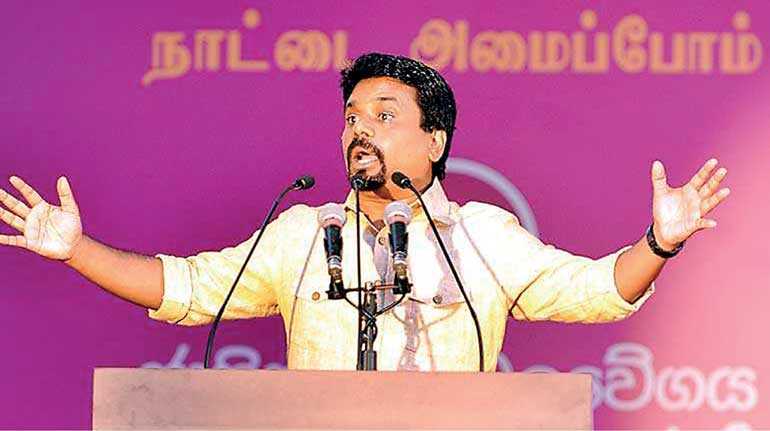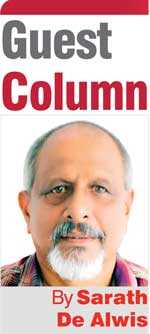Sunday Feb 15, 2026
Sunday Feb 15, 2026
Monday, 26 August 2019 00:00 - - {{hitsCtrl.values.hits}}

It was not Marx’s aim to discover the ‘eternal laws’ of economy. He denied the existence of such laws. The history of the development of human society is the history of the
succession of various systems of economy, each operating in accordance with its own laws. The transition from one system to another was always determined by the growth of the productive forces, i.e. of technique and the organisation of labour. Up to a certain point, social changes are quantitative in character and do not alter the foundations of society, i.e. the prevalent forms of property – Leon Trotsky in ‘Living thoughts of Karl Marx’
In the dark, forbiddingly bleak topography of our dysfunctional democracy, the emergence of the National People Power (NPP) coalition is a refreshingly propitious development.
The centre-left intelligentsia could not resist comparing it to the mass rally of the United Left Front that bought a similar multitude enthused by the possibility of a solid socialist solidarity in a coalition led by NM, Dr. Wicks and Philip.
The first speaker, old Samasamajist Lal Wijenayake recalled that Galle face was the launching pad for the great ‘Hartal ‘of 1952, organised by the left movement against the UNP’s comprador bourgeoisie regime. 
What struck me, was that none recalled the incident in Galle Face where our pioneering left stalwarts produced Mark Antony Bracegirdle after filing a habeas corpus petition preventing his deportation.
As far as I know, no Supreme Court judge recused himself from hearing the writ application on the grounds that he played bridge with Governor Stubbs who ordered the deportation.
This event in 1937, 11 years before our independence, was an epochal reiteration of a citizen’s right to free speech and liberty. With that skirmish with the ‘Raj’, our island nation was catapulted into modernity and the age of universal human rights.
It was our first brush with the true spirit of universal civic citizenship – a principle which one of the main contenders for the Presidency wishes to erase from the books.
Colonialism, despite its wickedness, introduced some fundamental principles that evolved during the age of enlightenment.
Forgetting Bracegirdle is natural. We have no historical memory of struggle in the evolution of democracy, its processes and institutions. The British gave us universal franchise and a parliamentary democracy.
Our C. W. W. Kananagara is forgotten just as Ambedkar is forgotten India! We don’t care for equality or champions of social justice. Democracy is horizontal. Our intrinsic cultural ethos is vertical and so is the mechanism of state.
Reason, tolerance, autonomy, conception of the rights of man, and the imperative of applying scientific methods in our social and political thinking instead of priestly witchcraft are distinctive values that we have adopted and practice with reluctance. We blabber about Lichchavi rulers engaging in democratic debate purely to hide the truth that democracy is a colonial legacy.
Reason, tolerance, autonomy, conception of the rights of man, and the imperative of applying scientific methods in our social and political thinking instead of priestly witchcraft are distinctive values that we have adopted and practice with reluctance. We blabber about Lichchavi rulers engaging in democratic debate purely to hide the truth that democracy is a colonial legacy
Karl Marx said it for all time, “Colonial transformation brought about the only social revolution ever heard of in Asia.”
No wonder, we do not remember how we ended up with the right of habeas corpus!
The message of the people’s power movement is very simple. Everybody has a vote. And yet a large swathe of our populace remains beyond the pale held hostage by clientelist politics, constantly negotiating allegiance in exchange for state patronage.
What is refreshing about the new movement is that it dramatically differs from mainstream political actors who, during times of electioneering, adopt short-term target-centric methods of conscience arousal of the common people – the hoi polloi by herd hysteria (invisible enemies) or mass mesmerising (cornucopia round the corner).
It is a path-breaking attempt by the Janatha Vimukthi Peramuna to broaden its political base beyond the ideological territory of Marxist Leninism that they claim to profess.
The germinal idea for this brief essay occurred to me on seeing a huge red flag with the hammer and sickle – the communist insignia which, in the public psyche, is more associated with Stalin’s dictatorship than with a promised dictatorship of the proletariat.
On the stage was vivacious Samanalee Fonseka of the ‘Aluth Parapura’ movement, one of the constituent groups of the movement. It is decidedly an alliance that includes the bourgeoisie or the town’s people living in urban high-rises with trendy pantries with empty refrigerators.
Catechism of ‘people’s power’ was explained by accomplished academic in western literary theory Professor Liyanage Amarakeerthi of the Peradeniya University Department of Sinhala.
He explained the reasons for the founding of the movement labelled ‘power of people’.
The raison d’être of the coalition of 28 activists groups was to educate the indifferent, mobilise the marginalised, and to effectuate a mass consciousness to find a way forward for a nation in drift. Restoration of parliamentary democracy was its imperative.
What does this proposition suggest? The JVP has unhesitatingly arrived at the realisation that the task ahead is to bring about changes within the existing parliamentary democracy.
The people’s power movement intends to challenge the holders of power and motivate the entire society to redress deep-rooted social grievances.
It is a protest against inequality and injustice. It seeks to restore critical civil society values and social norms.
By directly appealing to the mass consciousness of a society, it attempts to overpower tribal, parochial prejudices. It fosters the idea of a meaningful democracy – system of governance by and for the people.
In his classic work ‘Capitalism, Socialism, and Democracy’, Joseph Schumpeter describes democracy as “that institutional arrangement for arriving at political decisions in which individuals acquire the power to decide by means of a competitive struggle for the people’s vote”.
A more precise or succinct definition of democracy in the context of competitive party politics would be nearly impossible.
Now here comes the acid test for the Presidential candidate Anura Kumara Dissanayake and his party the JVP.
As the renowned political theorist Seymour Martin Lipset points out, we cannot ignore the umbilical link between a market economy and democracy.
It is a simple, absolute actuality conceded by Marxist encomiasts as well as Capitalist economists. Modern democracy is a product of the capitalist process.
Here comes the rub. No Bourgeoisie, no democracy! The famous adage is by Barrington Moore in his seminal work ‘Social Origins of Democracy and Dictatorship’.
I should contextualise these theoretical excursions in to the current and contemporary political circus.
Minister Patali Champika Ranawaka had told the US Ambassador that General Shavendra de Silva is our Ulysses Grant – the Civil War hero of the Americans.
The irony is inescapable. The founding fathers treated slaves as property. The US Civil War made true democracy possible. In our land, Civil War made us a family fiefdom. “I won a thirty-year war in three and half years. He! He!”Tracing the link between democracy and the urban middle-class, sociologist Moore demonstrates how the ‘southern landed aristocracy opposed the northern bourgeoisie’s democratising efforts, sparking the Ulysses’.
Post-Civil War commercial farmers and urban town dwellers fostered capitalism and democracy in that order.
Now this may sound a bit impudent.
Comrade Anura and the JVP must rediscover Marx in the context of the 21st century. Capitalism has its intrinsic contradictions. Socialism has had its successes and setbacks.
As South African socialists have painfully discovered, perennial questions about how and when humanity may advance to ‘a unique equilibrium without social antagonisms’ requires an ongoing transparent interrogation.
In that there should be no doctrinaire holy cows. The hammer and sickle emblem were out of place. Stalin made it the equivalent of the Swastika.
I think Samanalee Fonseka on the stage was sporting designer sunglasses. Atta girl, go for it.